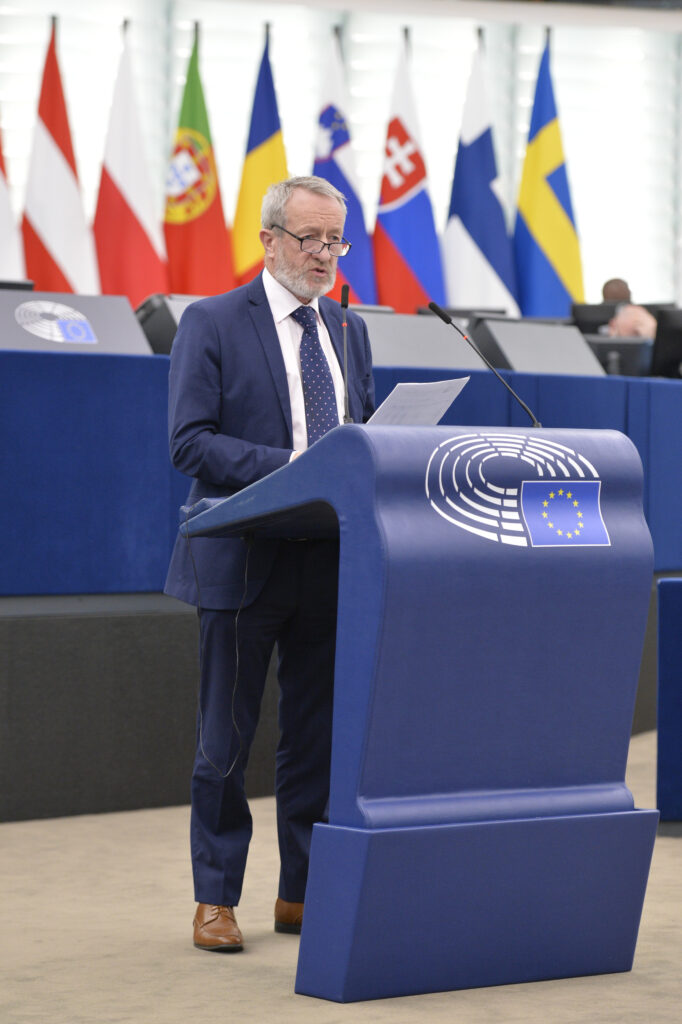The chief responsibilities of the INTA Committee relate to the European Union’s common commercial policy and its external economic relations. The main tasks of the Committee are to deal with the EU’s financial, economic and trade relations with third countries and regional organisations, which includes the creation of free trade agreements (FTAs) with other states and standardising trade across the bloc.
Ireland is a country with a small, open economy, which relies on harnessing the changing winds of international trade for its economic wellbeing. The EU has made huge progress in recent years in terms of expanding into global markets. What does it mean for the ordinary person? Studies show that every €1 billion in agri-food exports supports 20,000 jobs, many of them in rural areas. Every time we sign a trade agreement with a global partner, it has the possibility to benefit our farmers and food producers and bring jobs to our rural communities.
On the INTA Committee I work to push through the agreements that open up new markets for our high-quality exports. I currently hold the position of Standing Rapporteur for South East Asia in the EPP Group, and as a result will be responsible for important upcoming agreements with countries in the region, notably Indonesia. Additionally, I am the EPP Group Standing rapporteur on the Generalised Scheme of Preferences (GSP) which aims to help developing countries around the world through enhanced trade relations.

The ASEAN region is a dynamic market with some 640 million consumers and ranks as the eighth largest economy in the world. The countries as a group are the EU’s third largest trading partner outside Europe, after the US and China. In 2019, following my successful work on the EU-Singapore Free Trade Agreement, I was appointed as the EPP Group Standing Rapporteur for the region. This means that I am MEP in our political group that is responsible for all trade policy issues relating to the region.
Ensuring better access for EU exporters to the dynamic ASEAN market is a priority for the EU and indeed for the EPP Group. In the coming years, I hope to be able build on the successful agreements with Singapore and Vietnam and help to ensure further EU agreements with countries in the ASEAN region which offers huge potential for European Businesses.
I regularly engage in inter-parliamentary meetings with delegates from countries within the ASEAN bloc
Given our geographical proximity and historic economic ties, Ireland was uniquely affected from the fall out of Brexit. Since 2021, I have acted as the lead MEP in the trade committee, and for my political group, the EPP, on matters related to EU-UK trade.
In this role, I regularly meet with business people, civil society and government officials from countries within the EU and from the UK who have been affected by Brexit. Additionally, I continuously work to promote the voices of Northern Irish citizens, business and civil society in the European Parliament.
There are two key international agreements which now govern the EU’s relationship with the UK. These are the Withdrawal Agreement and the Trade and Cooperation Agreement. In my role as Standing Rapporteur on UK Trade, I have prepared two reports for the European Parliament on how these agreements are functioning. These reports are an important tool for Parliamentarians to scrutinise how the EU’s international agreements are working for European citizens and business. We propose new solutions that could ease trade barriers and strengthen cooperation with Ireland’s closest geographic neighbour.
The past year, and the signing of the Windsor Framework, has warranted a new chapter in the EU-UK relationship. However, the waters were not always so smooth. In the wake of the previous UK government’s Northern Ireland Protocol Bill, which proposed to breach international law, I led negotiations on behalf of the trade committee for a Brexit-sanctions mechanism, the purpose of this instrument was to empower the Commission to impose restrictions on trade, investment or other activities if the UK was to breach certain agreed trading conditions.
I am also a member of the UK Contact Group, and ad hoc group of MEPs working across the House. This group was established during the Brexit negotiation to set the political direction of the Parliament on EU-UK matters.
As chair of the Parliament’s UK Trade Monitoring Group, I regularly invite officials and stakeholders from the EU and UK to brief MEPs on matters related to EU-UK trade.
As mentioned above, I am keenly aware that Northern Irish representative no longer have a voice in the EU institutions, despite still being impacted by EU legislation under the Windsor Framework. For this reason, I have used my role as Chair of the monitoring group to invite members of Northern Irish civil society, academics and business organisations to engage with Parliamentarians.
In 2019 I was also appointed EPP Group Standing Rapporteur on the Generalised Scheme of Preferences (GSP). The aim of GSP is to remove import duties from products coming into the EU market from vulnerable developing countries. This helps these countries to alleviate poverty and create jobs based on international values and principles, including labour and human rights.
The EU constantly monitors the GSP countries to ensure they are effectively implementing the 27 international conventions on human rights, labour rights, environmental protection, and good governance – this is the condition of access to the EU market. Where countries are not in compliance, eventually market access may be rescinded, although not before due warning and extensive dialogue takes place. My work on this issue mainly relates to the monitoring of GSP agreements already in place, including exchanges of views and dialogue with representatives from GSP countries, discussion with civil society organisations, and participation in European Parliament observation and fact-finding missions.
I support CETA, an agreement that greatly reduces barriers to trade between the EU Member States and Canada.
The predicted economic benefits of CETA for Europe and Ireland are undeniable: an annual €12 billion GDP boost for the EU, with an estimated €1.2 billion boost in exports for Ireland. Ireland has an export-orientated economy. 80% of everything we produce is exported and tens of thousands of Irish jobs depend on trade and agreements. Ireland is also Canada’s fifth largest investment recipient and CETA will create better investment opportunities, increase competitiveness, and encourage innovation.
CETA has applied provisionally since September 2017. It has already had a positive impact on the Irish economy; Exports of Irish goods and services to Canada increased by 35% between 2016 (the last full year of trade prior to the provisional application of CETA) and 2019.
CETA is also hugely important for its geostrategic impact. Over one-fifth of our exports go to the US. However, the policies of the last US administration were at times unpredictable and somewhat protectionist as evidenced by the US’ withdrawal from the Trans-Pacific Partnership, for example.
The potential negative implications of Brexit on Ireland are well documented, and we cannot ignore the severity its impact will have on this country. Meanwhile, new world powers such as the BRIC countries of Brazil, Russia, India and China, continue to rise while turbulence persists in the Middle East, Turkey and elsewhere. The EU needs to take such factors into consideration, and secure reliable trading relationships in order to preserve our economic competitiveness and our status as the world’s largest economy.
Ireland has seen how much trade can help to secure and create jobs, and CETA will allow us to grow even more. Every €1 billion in exports supports 14,000 European jobs. The EU-South Korea trade deal resulted in 210,000 new jobs in Europe. Small and medium sized enterprises (SMEs) will benefit most. Removing the barriers to trade and providing clear rules for SMEs will create a more competitive trade and export environment. 99.7% of Irish businesses are SMEs and they need our support to continue to grow and create more jobs.
Having been appointed rapporteur in 2014, finally getting the agreement with Singapore over the line has been one of my proudest achievements in the European Parliament. After a long delay due to a request to the European Court of Justice to rule on the European Commission’s competence on trade issues, it was a pleasure to finally see Parliament support it in early 2019.
Singapore is by far the EU’s largest partner in the Southeast Asia bloc, with a total bilateral trade in goods of €53.3 billion (2017) and in services of €44.4 billion (2016). Over 10,000 EU companies are established in Singapore and use it as a hub to serve the whole Pacific region. Singapore is also the number one location for European investment in Asia, with investment between the two growing rapidly in recent years: bilateral investment stocks reached €256 billion in 2016.
This Agreement will remove nearly all remaining tariffs on certain EU products, simplify customs procedures and set high standards and rules. It simplifies trade in goods like electronics, food products and pharmaceuticals, while stimulating green growth. It opens up the market for services like telecommunications, environmental services and engineering.
It also includes a comprehensive chapter on trade and sustainable development, setting the highest standards of labour, safety, environmental and consumer protection, as well as strengthening joint actions on sustainable development and climate change.
The Investment Protection Agreement contains all aspects of the EU’s new approach to investment protection and its enforcement mechanisms. It will ensure a high level of investment protection, while safeguarding the EU’s and Singapore’s rights to regulate and pursue public policy objectives such as the protection of public health, safety and the environment.
Irish spirits industry exports 95% of its produce to over 80 international markets per annum. As the eighth largest spirit producer in Europe, this industry contributes approximately half a billion euro to the Irish economy per year. 10.2 billion euros in spirits is exported annually from the EU. I have been appointed to lead the negotiations on a legislative file on behalf of the EPP Group. The legislation, ‘Definition, presentation and labelling of spirit drinks, the use of the names of spirit drinks in the presentation and labelling of other foodstuffs and the protection of geographical indications for spirit drinks’, introduced measures that will improve EU-wide regulations regarding the sale and marketing of spirits

We use cookies to improve our website and your experience when using it. Cookies used for the essential operation of this site have already been set. To find out more about the cookies we use and how to delete them, see our privacy policy.
